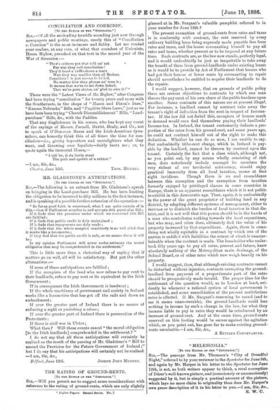MR. GLADSTONE'S ANTICIPATIONS.
[To THE EDITOR OF THE " SPECTATOR."] S1R,—The following is an extract from Mr. Gladstone's speech on bringing in the Land-purchase Bill. He has been limiting the obligation to be incurred to fifty millions in the first instance,
and is speaking of a possible further extension of the operation :-
" So far as good faith is concerned, what I am quite certain of is this,—that if Parliament accedes to and accepts this particular Bill ; If it finds that the promises under which we commend this Bill are fulfilled ;
If it finds that public credit is duly maintained ; If it finds that repayments are duly made ;
If it finds that the whole complex machinery is so well oiled that it works like a locomotive ; If they find that the public credit is safe, as we assure, them it will be ; In my opinion Parliament will never under-estimate the moral obligation that may be comprehended in the settlement."
This is little more than a rhetorical way of saying that if matters go on well, all will be satisfactory. But put the other alternatives :— If none of these anticipations are fulfilled ; If the occupiers of the land who now refuse to pay rent to their landlords, refuse to pay rent or its equivalent to the Irish Government ; If in consequence the Irish Government is insolvent ; If the whole machinery of government and society in Ireland works like a locomotive that has got off the rails and down an embankment; If over the greater part of Ireland there is no means of enforcing a right or punishing a crime; If over the greater part of Ireland there is persecution of the Protestants ; If there is civil war in Ulster ; What then P Will these events cancel " the moral obligation [to the Irish landlords] comprehended in the settlement ? "
I do not say that all these anticipations will certainly be realised as the result of the passing of Mr. Gladstone's " Bill to amend the Provision for the Fntnre Government of Ireland ;" but I do say that his anticipations will certainly not be realised. —I am, Sir, &c.,




































 Previous page
Previous page